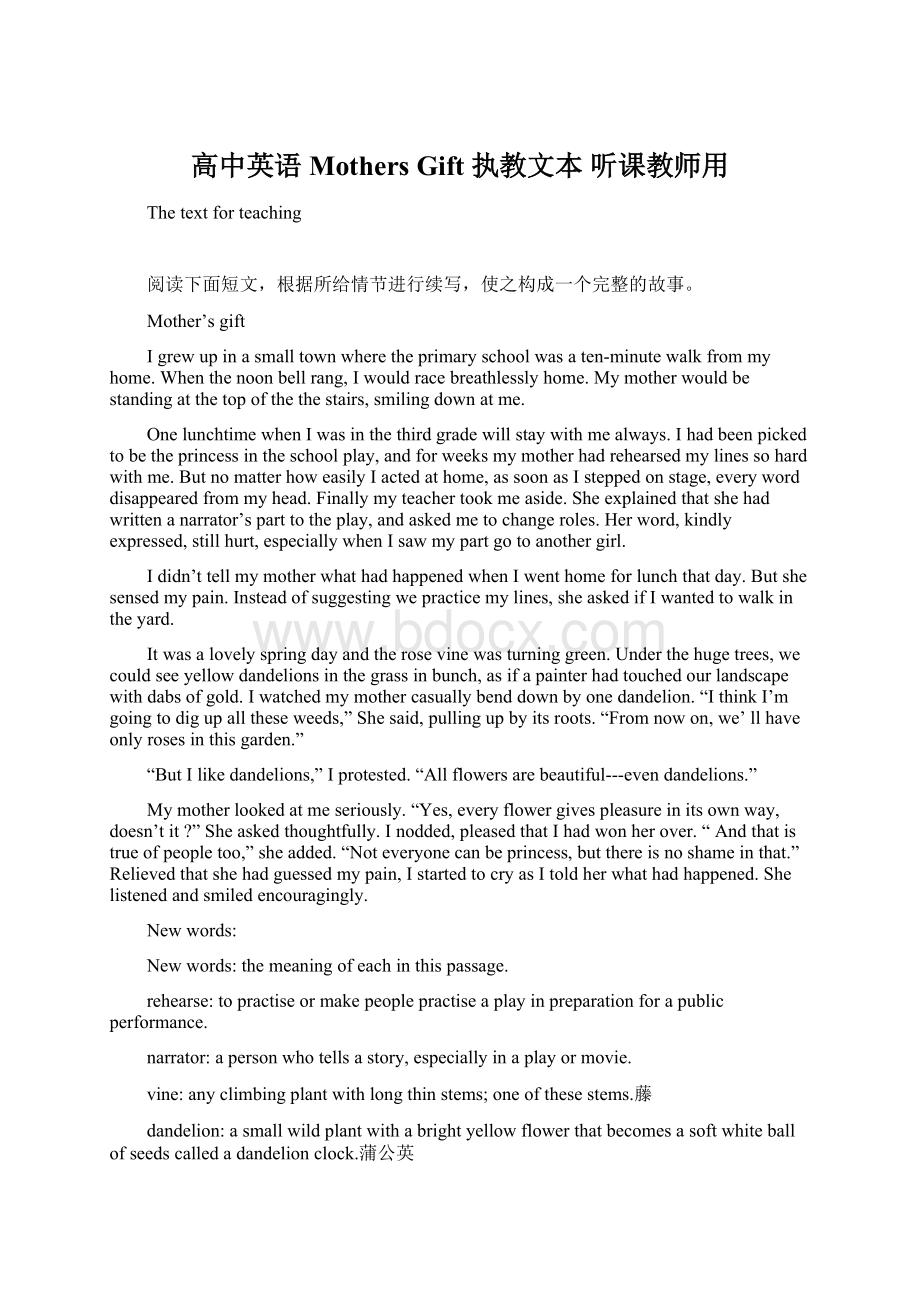高中英语Mothers Gift 执教文本 听课教师用.docx
《高中英语Mothers Gift 执教文本 听课教师用.docx》由会员分享,可在线阅读,更多相关《高中英语Mothers Gift 执教文本 听课教师用.docx(15页珍藏版)》请在冰豆网上搜索。

高中英语MothersGift执教文本听课教师用
Thetextforteaching
阅读下面短文,根据所给情节进行续写,使之构成一个完整的故事。
Mother’sgift
Igrewupinasmalltownwheretheprimaryschoolwasaten-minutewalkfrommyhome.Whenthenoonbellrang,Iwouldracebreathlesslyhome.Mymotherwouldbestandingatthetopofthethestairs,smilingdownatme.
OnelunchtimewhenIwasinthethirdgradewillstaywithmealways.Ihadbeenpickedtobetheprincessintheschoolplay,andforweeksmymotherhadrehearsedmylinessohardwithme.ButnomatterhoweasilyIactedathome,assoonasIsteppedonstage,everyworddisappearedfrommyhead.Finallymyteachertookmeaside.Sheexplainedthatshehadwrittenanarrator’sparttotheplay,andaskedmetochangeroles.Herword,kindlyexpressed,stillhurt,especiallywhenIsawmypartgotoanothergirl.
Ididn’ttellmymotherwhathadhappenedwhenIwenthomeforlunchthatday.Butshesensedmypain.Insteadofsuggestingwepracticemylines,sheaskedifIwantedtowalkintheyard.
Itwasalovelyspringdayandtherosevinewasturninggreen.Underthehugetrees,wecouldseeyellowdandelionsinthegrassinbunch,asifapainterhadtouchedourlandscapewithdabsofgold.Iwatchedmymothercasuallybenddownbyonedandelion.“IthinkI’mgoingtodigupalltheseweeds,”Shesaid,pullingupbyitsroots.“Fromnowon,we’llhaveonlyrosesinthisgarden.”
“ButIlikedandelions,”Iprotested.“Allflowersarebeautiful---evendandelions.”
Mymotherlookedatmeseriously.“Yes,everyflowergivespleasureinitsownway,doesn’tit?
”Sheaskedthoughtfully.Inodded,pleasedthatIhadwonherover.“Andthatistrueofpeopletoo,”sheadded.“Noteveryonecanbeprincess,butthereisnoshameinthat.”Relievedthatshehadguessedmypain,IstartedtocryasItoldherwhathadhappened.Shelistenedandsmiledencouragingly.
Newwords:
Newwords:
themeaningofeachinthispassage.
rehearse:
topractiseormakepeoplepractiseaplayinpreparationforapublicperformance.
narrator:
apersonwhotellsastory,especiallyinaplayormovie.
vine:
anyclimbingplantwithlongthinstems;oneofthesestems.藤
dandelion:
asmallwildplantwithabrightyellowflowerthatbecomesasoftwhiteballofseedscalledadandelionclock.蒲公英
landscape:
apaintingofaviewofthecountryside.
dabsof:
alittleof
casual:
relaxed/informal;notplanned.casuallyadv.
protest:
theexpressionofstrongdisagreementwithsth.
pleasure:
athingthatbringsyouenjoymentorsatisfaction.
relieve:
toremoveorreduceanunpleasantfeelingorpain.
TeachingDesignforContinuationWriting
PartI:
analysisoftheteachingmaterial---Mother’sgift
InterpretationoftheText文本解读
这是一篇记叙文。
文章叙述了作者“我”回忆一则儿时失意之事,后来在母亲的引导下,“我”终于醒悟成长的故事。
在文本阅读过程中,我们可侧重记叙文的六要素“who,when,where,what,why和how”中的“who,when和what"对整个文章做一个梳理,概括出大意,从而根据时间的推进与故事的情节发展理解全文。
文章的时间、情节和情感线比较容易把握,在理解文本的过程中,可结合上下文了解母女之间的沟通方式,依托情节“选角色”的发展中,逐渐深入理解文本,为最后的续写输出做好各方面准备。
时间线:
OnelunchtimewhenIwasinthethirdgrade./whenIwenthomeforlunchthatday.实际上,第二、三两段出现的时间线索是同一个时间。
作者在首段介绍了母女之间的日常,展示了她们之间的亲密关系--尽管学校很近,每天放学我会第一时间回家,而母亲也会等在家门口。
故事情节线:
“我”一开始被老师选为话剧表演的主角——公主。
但是由于自己台词现场表现能力欠缺,最终被换成旁白的角色。
故事情节进入发展期。
在受了打击之后,母亲感受到了“我”内心中的失落。
她并没有直接言语安慰,而是带“我”来到花园里,通过比较艳丽夺目的玫瑰和平凡温馨的蒲公英,让“我”明白一个道理——每个人都有自己的美丽。
故事情节进入较高潮时期。
而最高潮应是续写的两段话——母亲的言语对我人生的启迪。
两条故事情感线:
读后续写的文本侧重情感积极向上的走向,因此,在作者回忆儿时与母亲之间难忘的经历的时候,拿出这件很有教育意义的事情,不但回忆事件,也回忆母亲。
①文章从一开始就从侧面反映出“我”依赖母亲的情感,因为每天放学都是飞奔回家,投入母亲的怀抱。
②在第二段学校选角事件中,“我”信任母亲,找母亲一起练习,排练。
由于后来自己临场能力欠佳,被老师换角。
在失落之余,母亲以蒲公英为载体,深入浅出地引导我,用比拟的智慧让我体会到人生的真谛,与此同时,也体现出“我”感激母亲,对她教育智慧的终身难忘之情感。
PartII:
analysisofthestudents
这节课是面对高二的学生授课,据了解这是他们第一次接触“读后续写”这一新题型。
为了使本节课有效衔接和顺利进行,特编制了一个课前案“感知新题型
:
读后续写”,让同学们在课前熟悉阅读之以达到整体感知这一题型的目的。
PartIII.TeachingObjectives:
1)Beabletoknowwhattoreadandhowtoread(basedonthenarrativewritingstyle,mainplotsofthepassage,tenunderlinedkeywords,twogivensentences).
2)Beabletoknowwhattowriteandhowtowrite(logicallyinferpossibleplots,reasonablyarrangedetails,layemphasisondescribingone’sfeelings—TheMicro-skillsinwriting).
3)Learntothinklogicallyandcritically,duringtheprocessofreadingandwriting.
PartIV:
TeachingProcedures
Leadin:
Accordingtotheteachingplanbeforeclass,mentionbasicrequirementsoncontinuationwriting.Basedonthemainplotsofthepassage,tenunderlinedkeywordsandtwogivensentences,continuetowritetheunfinishedstorytomakethewritingcoherent\logical\reasonable\complete.
Step1:
Readforthemaininformation:
(Principle1:
BeaReadyDetective)
Accordingtothesixelementsofnarrativewriting,trytofindout:
when、where、who、what、why、how.especially:
Who?
1.Whenthenoonbellrang,wouldracebreathlesslyhome.Mywouldbestandingatthetopofthestairs,smilingdownatme.
2.hadbeenpickedtobetheprincessintheschoolplay,andforweeksmyhadrehearsedmylinessohardwithme.
3.Finallytookmeaside.explainedthatshehadwrittenanarrator'sparttotheplay,andaskedtochangeroles.
4.Relievedthathadguessedmypain,startedtocryasItoldherwhathadhappened.listenedandsmiledencouragingly.
When?
1.OnewhenIwaswillstaywithmealways.
2.Ididn’ttellmymotherwhathadhappenedwhenIwenthome.
Where?
1.Whenthenoonbellrang,Iwouldracebreathlessly.Mymotherwouldbestanding,smilingdownatme.
2.ButnomatterhoweasilyIacted,assoonasIstepped,everyworddisappearedfrommyhead.
3.Insteadofsuggestingwepracticemylines,sheaskedifIwantedtowalk.
Why?
1.Ihadbeenpickedintheschoolplay...
2....everywordfrommyhead.
3.Sheexplainedthatshehadwrittenanarrator'sparttotheplay,andaskedme.
4.Herword,kindlyexpressed,still,especiallywhenIsaw.
What?
1.Insteadofsuggestingwepracticemylines,sheaskedifIwantedto..
2.“IthinkI'mgoingto,”Shesaid,pullingupbyitsroots.“Fromnowon,we’llhaveinthisgarden.”
Ideology&morality:
(思想品德—成长教育)
1.Allflowersarebeautiful---evendandelions.
2.Everyflowergivespleasureinitsownway.
3.Andthatistrueofpeopletoo.
Step2:
Readforthemainplot
How:
1.theplotline:
tobetheprincess→tobeanarrator→mymothersensedmypain→twokindsofflowersintheyard→mymother'swords
2.thefeelingline:
motherandI,clingingtoeachother→Ibelievedinmymother→Iwasgratefulformymother→Ilovedmymothermoredeeply
Step3:
Infertheending(G-Nstrategy)
1.Findouttheconnectionbetweentwogivensentences,andespeciallytheconnectionbetweenthesecondgivensentenceandthefirstgivensentenceaswellastheconnectionbetweentheendofthegivenpassageandthefirstgivensentence.Trytomakethetransitionclose\reasonable\natural.(G-Nstrategy)
Para.1GivenInformation:
Ihadbeenpickedtobetheprincessintheschoolplay,andforweeksmymotherhadrehearsedmylinessohardwithme.(Para.2)
Sheexplainedthatshehadwrittenanarrator’sparttotheplay,andaskedmetochangeroles.(Para.2)
Para.1Inferenceofgiveninformation:
Q1:
Whatelsedidauthor’smothersaytotheauthor?
Q2:
Whatdidmotherdotocomforttheauthor?
Q3:
Whatistheflower?
Q4:
Whogavetheflowertotheauthor?
Q5:
Howdidtheauthorfeelafterreceivingtheflower?
Para.2GivenInformation:
Mymotherlookedatmeseriously.“Yes,everyflowergivespleasureinitsownway,doesn’tit?
”Sheaskedthoughtfully.(para.6)
Para.2Inferenceofgiveninformation:
Q1:
Whatdidtheauthordowiththeflower?
Q2:
Wheredidtheauthorputthisdandelion?
Q3:
Whatdidmothersayanddototheauthor?
Q4:
Whatlifelessondidtheauthorlearnfromthisexperience?
2.Focusontenunderlinedkeywords.
Classifythemandselectsomeofthem,andwhatisespeciallyimportantistofindouttheclueofthepassage.
Interpretationofunderlinedwords:
(classifythe10underlinedwordsandputthemintothefollowingtable)
Characters人物类
I,mother
Objects事物类
Dandelions,flower
Behavior行为类
Sense,benddown,smile
Description描述类
Kindly,lovely,beautiful
Step4:
Makeadraft.(Principle2:
Beareasonablenovelist.)
severalminutesforstudentstowritethelasttwoparagraphsofthestory.
Paragraph1:
“Butyouwillbeabeautifulnarrator,"shesaid,
Paragraph2:
Aftertheplay,Itookhometheflower.
Step5:
Polishyourwriting(refertothecriteriaforassessment)(Principle3:
Bearesponsibleeditor.)
Trytowriteandpolishthewritingbyusingdifferentstructuresandtransitionalwordsaswellasaddrelevantdetails.TheMicro-skillsTraininginwriting.
1、severalminutesforstudentstowritethelasttwoparagraphsofthestory,andthenexchangetheworkswiththeirpartnerstodosomepolishing.
2、students'worksshowandassessment:
selfevaluateormutualevaluatethewriting.
3、toappreciateonepossibleversion.
Summary:
Stepstocontinueastory.
Homework:
1.Finishyourwritingandpolishit.
2.Shareyourwritingwithyourclassmates.
3.Trytolearnfromyourclassmateandinthemeantimegivesomeadviceonimprovingtheirwriting.
课前案
感知新题型
:
读后续写
一、命题特点:
《普通高中英语课程标准(2017年版)》中有关高考的要求:
能概述所读语篇的主要内容或续写语篇。
山东省自2020年起,高考写作即将开始采用这一题型。
读后续写是一种将阅读与写作紧密结合的考查形式,旨在考查考生的综合语言运用能力。
这一题型主要考查考生4个方面的能力:
一是把握短文关键信息和语言特点的能力;二是语言运用的准确性和丰富性能力;三是对语篇结构的把控能力;四是创造性思维能力。
读后续写——给出前文,写后文。
理论上来说,前文用于阅读输入信息,在大脑思维中建立一个对前文的理解框架和概括,建立顺序思维,确定如何安排下面继续可能或者应该出现的内容。
续写部分内容不仅要求词汇和语言框架的准确使用、语言的润色等,更重要的是,使其和前文形成统一连贯的、能够表述完整信息的表达内容。
续写是读和写的统一,之间穿插了对阅读能力、概括能力、思维转化能力、语言领悟能力、语言组织能力、创造性思维能力以及对上下文逻辑关系的掌握等的考查。
高质量地完成读后续写最重要的是要通过大量阅读信息的输入,形成一定的阅读思维能力。
因此对续写的前文的理解是这一题型的最关键部分。
二、题型特点:
读后续写的阅读材料一般以350词以内的记叙文和夹叙夹议文为主,偶有少量议论文。
考生要在此文的后面续写约150词左右的文字与前文构成一个完整的故事。
一般来说,记叙文浅显易懂,但故事情节多曲折动人,